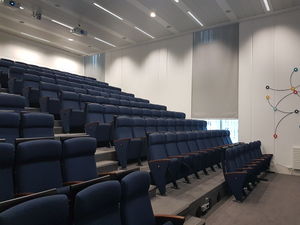Celtic Knot Conference 2017/Programme/CK115: Difference between revisions
- |
- |
||
| (3 intermediate revisions by the same user not shown) | |||
| Line 13: | Line 13: | ||
'''Panel members''': | '''Panel members''': | ||
* Àlex Hinojo. | * Àlex Hinojo - Executive Director, Amical Wikimedia. | ||
* Gareth Morlais. | * Gareth Morlais - Uned y Gymraeg - Welsh Language Unit, Llywodraeth Cymru - Welsh Government. | ||
* Dr. Susan Ross. | * Dr. Susan Ross - Gaelic Wikipedian in Residence at the National Library of Scotland. | ||
'''Overview of topic:'''<br> | '''Overview of topic:'''<br> | ||
| Line 21: | Line 21: | ||
Join us to discuss the strengths and pressing challenges of the Celtic and Indigenous language communities, how these are being championed and addressed, and how we continue to move forward. Attendees will be encouraged to contribute to this session. | Join us to discuss the strengths and pressing challenges of the Celtic and Indigenous language communities, how these are being championed and addressed, and how we continue to move forward. Attendees will be encouraged to contribute to this session. | ||
'''Questions to be | '''Questions to be discussed''': | ||
#What are the best methodologies for community engagement and how do we avoid ‘pickling’ a language? | #What are the best methodologies for community engagement and how do we avoid ‘pickling’ a language? | ||
#What are the challenges of supporting and engaging both native and learner communities? | #What are the challenges of supporting and engaging both native and learner communities? | ||
'''Addtional questions to be considered''': | |||
* What are the barriers in terms of local, national, and international policy to supporting language communities? And how can these be overcome? | |||
* A recent study suggested Indyref supporters were more likely to use Scots words. Is the use of a Celtic and Indigenous language a political act? Are languages inherently political? To what extent have some Celtic & Indigenous languages been adopted by political movements? Or is it the other way round? | |||
'''Notes:''' [https://etherpad.wikimedia.org/p/Celtic_Knot_-_Closing_plenary_panel Etherpad link]. | '''Notes:''' [https://etherpad.wikimedia.org/p/Celtic_Knot_-_Closing_plenary_panel Etherpad link]. | ||
Latest revision as of 22:42, 2 July 2017
Title: The Politics of Language Online - Plenary Panel

Date: 6 July 2017
Time: 4:15pm to 5pm.
Duration: 45 minutes.
Venue: University of Edinburgh Business School - Auditorium.
Chair: Lorna Campbell.
Panel members:
- Àlex Hinojo - Executive Director, Amical Wikimedia.
- Gareth Morlais - Uned y Gymraeg - Welsh Language Unit, Llywodraeth Cymru - Welsh Government.
- Dr. Susan Ross - Gaelic Wikipedian in Residence at the National Library of Scotland.
Overview of topic:
Our panelists will draw on the range of research, activism and discussion seen at Celtic Knot to critically reflect on where the Celtic & Indigenous language communities are, and where they are heading.
Join us to discuss the strengths and pressing challenges of the Celtic and Indigenous language communities, how these are being championed and addressed, and how we continue to move forward. Attendees will be encouraged to contribute to this session.
Questions to be discussed:
- What are the best methodologies for community engagement and how do we avoid ‘pickling’ a language?
- What are the challenges of supporting and engaging both native and learner communities?
Addtional questions to be considered:
- What are the barriers in terms of local, national, and international policy to supporting language communities? And how can these be overcome?
- A recent study suggested Indyref supporters were more likely to use Scots words. Is the use of a Celtic and Indigenous language a political act? Are languages inherently political? To what extent have some Celtic & Indigenous languages been adopted by political movements? Or is it the other way round?
Notes: Etherpad link.
Supporting material:
Related sessions: